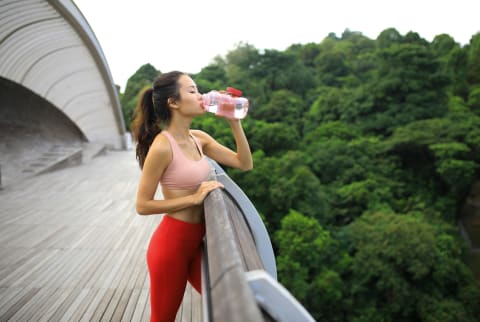Advertisement
Do Electrolytes Actually Reduce Nausea & Cramps? New Study Digs In


From young kids after soccer practice to cross-country endurance athletes, the idea of replenishing electrolytes with sports drinks has long been used for athletic recovery. But do those electrolyte supplements really have any benefits? A new study published in the Clinical Journal of Sports Medicine said probably not.
Researchers from the Stanford University School of Medicine found electrolyte supplements might not actually help athletes as much as previously thought.
What are electrolytes supposed to do?
Electrolyte supplements—which can be taken in pill, powder, or liquid form—have long been recognized as a way to replenish electrolytes, like sodium, after athletes sweat them out.
"Electrolyte supplements are promoted as preventing nausea and [muscle] cramping caused by low salt levels, but this is a false paradigm," said Grant Lipman, M.D., lead author of the study. Along with drinking lots of water, athletes have been taking electrolytes to prevent electrolyte imbalances and dizziness from overexertion.
Not only has their ability to prevent illness and improve performance yet to be proven, but, Lipman also said, "if diluted with too much water [electrolytes] can be dangerous."
What are the dangers?
Though electrolytes are often taken to ensure sodium levels never dip too low, spiking those levels too high can be just as dangerous. The study focused on both extremes of electrolyte imbalance.
Hypernatremia is caused by a rise in sodium levels associated with dehydration and can lead to dizziness and vomiting. On the other hand, exercise-associated hyponatremia (EAH) is caused by a drop in sodium levels from drinking too much water during exercise. EAH can lead to seizures, altered mental states, and other health problems.
"Most athletes worry about dehydration, but that won't kill you," Lipman said. "The reality is dehydration is not as dangerous as overhydrating."
What did the researchers find?
Unfortunately, electrolyte supplements cannot protect athletes from things like EAH or other illnesses. Researchers analyzed 266 ultramarathoners—aka people who run 155 miles through extreme weather and environmental conditions within seven days.
On the last day, the researchers took a blood test to examine sodium levels. Results showed 41 athletes had sodium imbalances, including 11 with EAH (too little sodium) and 30 with dehydration and too much sodium. "Overhydrating can reduce electrolyte levels, and electrolyte supplements aren't going to protect you," Lipman said.
So how do athletes maintain a healthy electrolyte balance?
According to the findings, training for longer distances, maintaining a lower body mass, and avoiding overhydration are more promising factors in preventing imbalance than electrolyte supplements.
Since 98 participants ran in temperatures averaging 93 degrees Fahrenheit, and 88% of the sodium imbalances occurred during hot races, Lipman said, "You have to be smart while exercising, especially in the heat when you are sweating more and have greater hydration requirements."
Co-author of the study and one of the ultramarathoners, Patrick Burns, M.D., said he won't stop using electrolytes while training, but it does raise questions about their benefits. Listening to your body, according to Lipman, is the best way to weigh in on your health during these extreme sports. "Stop drinking if you feel bloated or nauseous. Drink to thirst, not at regularly scheduled intervals."
Thirsting for more? Here are some foods that will help you stay hydrated, plus tips to aid your recovery.